Contract Lifecycle Management : How AI Softwares can help?
AI revolutionizes Contract Lifecycle Management (CLM), elevating contract managers from administrative roles to strategic contributors. While AI offers unprecedented insights and efficiency, it's the synergy between human intuition and machine precision that pushes operational excellence.

An Introduction to Strategic Contract Management
Contracts are the lifeblood of modern business, forming the official record of every relationship, sale, and commitment. However, for many organizations, outdated and inefficient processes turn these critical assets into a source of significant risk and revenue loss. Poor contract management is not a minor administrative issue; it is a direct threat to financial health, proven to erode an average of 9.2% of annual revenue.
This guide delivers a definitive analysis of Contract Lifecycle Management (CLM), tracing its journey from a reactive, paper-based function to a proactive, AI-driven strategic tool. We will demonstrate how a modern CLM strategy, powered by intelligent contract management software, is no longer just a defensive measure to prevent value leakage. It is a fundamental engine for accelerating revenue, strengthening risk mitigation, and ensuring enterprise-wide compliance.
Throughout this guide, we will explore the technology transforming the industry, including Artificial Intelligence (AI) and Machine Learning (ML). We will break down the tangible return on investment (ROI) and examine how CLM platforms provide the essential audit trails needed to navigate complex regulations like GDPR, HIPAA, and SOX. Ultimately, this report provides a clear roadmap for selecting, implementing, and mastering a CLM solution to secure your organization's future.
Source
[1]

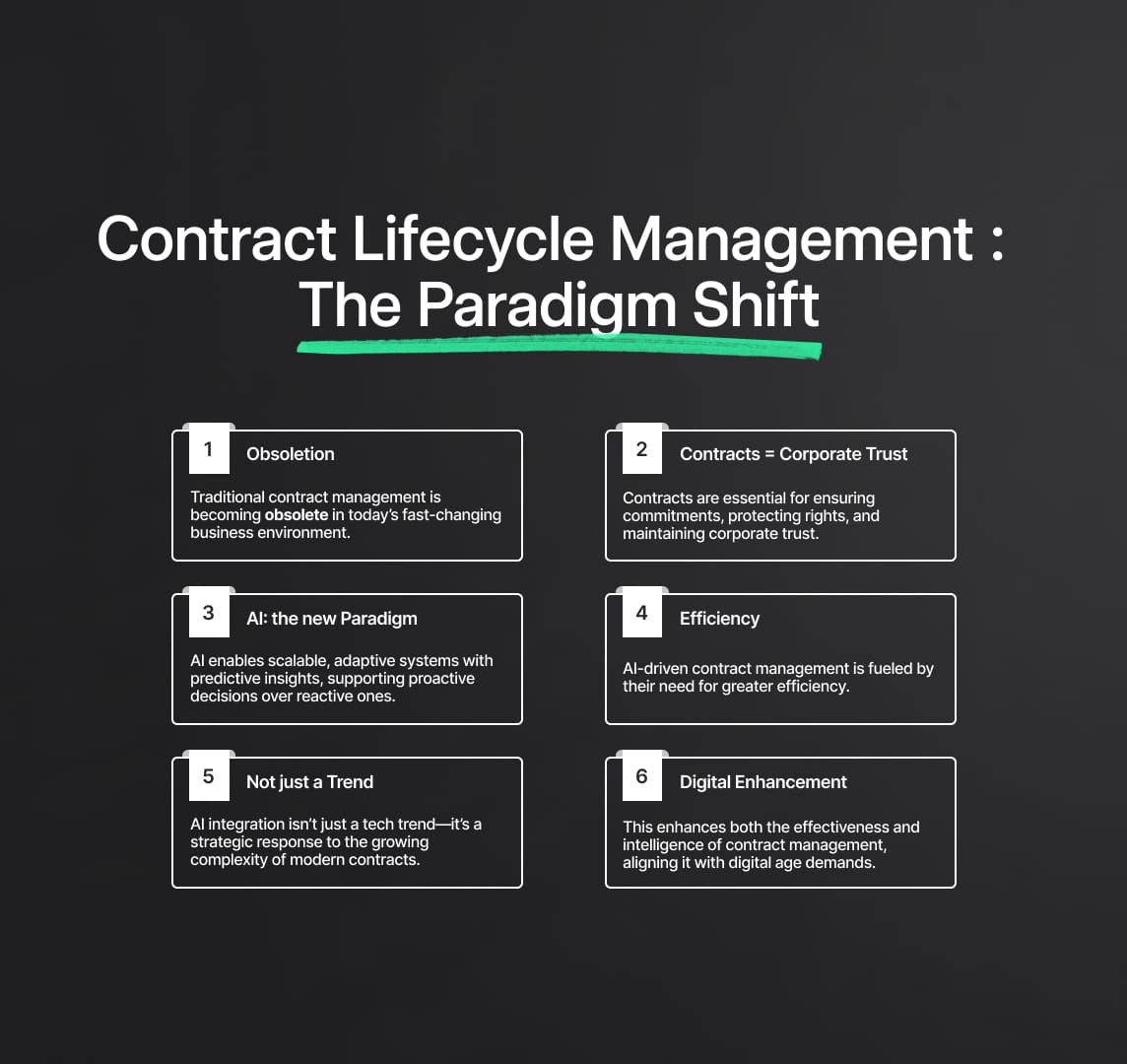
Why Modern Contract Management is a Strategic Imperative
The business world is experiencing a fundamental shift in how it perceives contract management. Once viewed as a back-office administrative burden, it is now correctly identified as a core strategic function. This recognition is driven by a clear-eyed view of the immense value lost through poor practices and the decisive competitive advantage gained by mastering the contract lifecycle.
The True Cost of Inaction: Quantifying Contract Value Erosion
The most compelling reason to prioritize Contract Lifecycle Management is the staggering cost of neglect. Ineffective practices create a silent and continuous drain on profitability. Authoritative studies from bodies like World Commerce & Contracting (WCC) consistently reveal that businesses lose an average of 9.2% of their annual revenue due to poor contract management. For a company generating $1 billion in revenue, this translates to an avoidable $92 million loss each year.
Further analysis highlights the severity of this problem. A KPMG report revealed that operational inefficiencies can cause an organization to lose up to 40% of a contract's value over its lifespan. This loss is not a single event but a "death by a thousand cuts," resulting from missed deadlines, substandard negotiation intelligence, poor obligation tracking, and a failure to enforce agreed-upon terms. This data reframes investing in contract management software not as an expense, but as a direct mechanism for recovering millions in lost revenue.
The critical insight is this: most value erosion happens after the contract is signed. This fact challenges the traditional, legal-centric focus on pre-signature activities. While drafting strong terms is essential, the real financial damage accumulates from post-signature failures. This includes missed renewal dates, failure to track service-level agreements (SLAs), and the unchecked auto-renewal of "zombie contracts" that continue without strategic review. A world-class legal team can secure brilliant terms, only for that value to vanish due to poor post-signature governance. Therefore, the focus of modern Contract Lifecycle Management must be on realizing the full, intended value of the agreement throughout its entire lifecycle.
The 8 Core Stages of the Modern Contract Lifecycle
To build an effective strategy, you must first understand the distinct phases of a contract's journey. This framework provides a clear map for identifying bottlenecks and applying solutions. The modern contract management process is universally understood to consist of eight core stages.
- Request and Initiation: The lifecycle begins when a business need generates a request for a contract, whether it's an NDA, MSA, or sales agreement. This initial stage involves defining the contract's core purpose and requirements.
- Drafting/Authoring: The contract is created. In mature organizations, this is performed using standardized templates and pre-approved clause libraries within their contract management software to ensure compliance from the start.
- Review and Negotiation: Often the most intensive stage, this involves internal reviews by legal, finance, and other stakeholders, as well as external negotiation with the counterparty through redlining and collaboration.
- Approval: Once all parties agree on the terms, the contract is routed through automated internal workflows to designated decision-makers for final sign-off.
- Execution: The contract is formally signed. This stage is now dominated by secure e-signature solutions integrated into CLM platforms, which can accelerate execution times by up to 80% compared to traditional methods.
- Obligation and Compliance Management: In this vital post-signature phase, all contractual obligations, deliverables, and compliance requirements are actively tracked. Failure to manage this stage is the primary source of value leakage.
- Renewal or Termination: As the contract's end date nears, a strategic decision is made to renew, renegotiate, or terminate. Proper management here prevents unwanted auto-renewals and ensures ongoing value.
- Record Keeping and Auditing: The executed contract and all associated documents are archived in a secure, centralized repository. This creates a complete, searchable record and an immutable audit trail for analysis and compliance checks.
The Evolution of CLM: From Digital Filing Cabinet to System of Intelligence
The technology supporting the contract lifecycle has undergone a dramatic transformation, moving from simple storage to a source of strategic insight. This evolution can be understood in three distinct phases.
- Phase 1: System of Record. Early digital CLM focused on solving a physical storage problem. First-generation platforms were essentially digital filing cabinets designed to digitize, store, and retrieve contracts. While an improvement, this functionality was passive; the platform held information but did little with it.
- Phase 2: System of Engagement. The next evolution made contract management software more interactive. These systems of engagement actively managed the process with automated alerts for key dates, configurable approval workflows, and collaboration tools. The platform was no longer passive, but its actions were still fundamentally reactive to pre-set triggers.
- Phase 3: System of Intelligence. The current era of Contract Lifecycle Management is defined by Artificial Intelligence. AI transforms a CLM platform from a management tool into an intelligent advisor. By using machine learning and natural language processing, this system of intelligence can analyze contracts to identify risks, flag non-standard clauses, and provide deep analytical insights into performance. Contracts are no longer seen as static legal text but as dynamic data assets that inform business strategy.
This progression mirrors the evolution of other critical enterprise platforms like CRM and ERP, which also evolved from systems of record to systems of intelligence. This parallel confirms that the transformation of contract management is a key part of the enterprise-wide shift toward data-driven strategy. The goal is no longer just to adopt a CLM system, but to integrate this powerful system of intelligence with other business platforms to create a unified, holistic view of your organization.
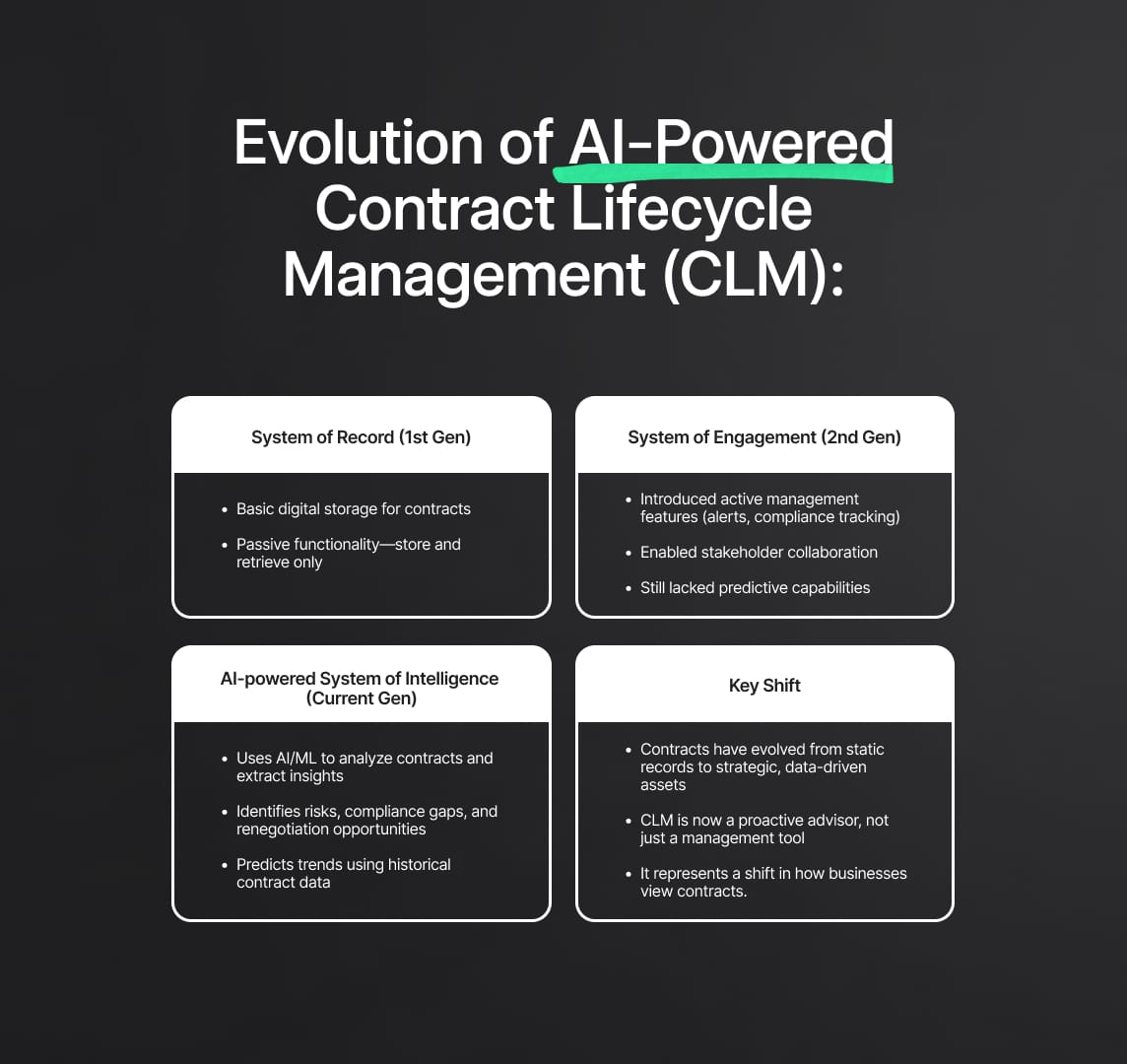
The AI Revolution in Contract Lifecycle Management
The term "Artificial Intelligence" is everywhere, but its practical application within Contract Lifecycle Management (CLM) is a sophisticated combination of technologies. This is not a single concept but a powerful technology stack where each layer builds upon the last. Together, they transform static legal documents into dynamic business assets, revolutionizing the entire field of contract management.
Deconstructing the AI Engine: The Technology Stack in Modern CLM Software
Modern, AI-powered contract management software operates on a cohesive system of technologies to deliver its advanced capabilities. This stack can be broken down into four primary layers that work in synergy.
1. Optical Character Recognition (OCR) & Computer Vision
This is the foundational layer, the essential starting point for bringing legacy contracts into a modern intelligence ecosystem. Most organizations have thousands of historical contracts stored as scanned PDFs or image files, which are unreadable to a computer. OCR technology solves this by converting these images into machine-readable, searchable text. The process involves several key steps:
- Image Preprocessing: The software automatically cleans the digital image, correcting its orientation (deskewing) and removing digital spots (despeckling) to improve text clarity.
- Text & Layout Recognition: Advanced algorithms identify individual characters and analyze the document's structure, segmenting it into logical elements like text blocks and tables.
Without OCR, the immense intelligence contained in an organization’s historical contracts would remain locked away and unusable for any modern contract management analysis.
2. Natural Language Processing (NLP)
Once OCR has extracted the raw text, NLP acts as the interpretive layer, enabling the software to "read" and "understand" the complex language of a contract. This goes far beyond simple keyword searches. NLP is crucial for:
- Named Entity Recognition (NER): This function automatically identifies and categorizes key data points, such as contracting parties, effective dates, governing law, and monetary values.
- Clause Identification and Classification: Advanced NLP models parse and classify entire clauses, identifying blocks of text as "Limitation of Liability," "Indemnification," or "Confidentiality." This is the critical process that turns unstructured legal text into structured data for analysis.
3. Machine Learning (ML)
This is the analytical and predictive layer of the stack. ML algorithms are trained on vast datasets of contracts, allowing them to learn and recognize complex patterns and anomalies that are impossible for a human to detect. This enables two of the most powerful features in a modern Contract Lifecycle Management platform:
- Intelligent Risk Analysis: An ML model can compare a clause from a third-party contract against thousands of others, flagging it as high-risk if it deviates from internal playbooks or industry standards.
- Predictive Analytics: By analyzing historical data, ML can forecast outcomes, such as the likelihood of a contract renewing or potential bottlenecks in the approval process.
4. Generative AI (GenAI)
Built on Large Language Models (LLMs), Generative AI is the most transformative layer. It does not just analyze existing content; it creates new, contextually relevant content. Within contract management software, its applications are expanding rapidly:
- Automated Drafting: A user can issue a simple prompt, and GenAI can produce a complete first draft of a standard agreement in seconds.
- Intelligent Summarization: GenAI can read a 50-page document and deliver a concise, accurate summary of key terms, obligations, and risks.
- Negotiation Assistance: When a counterparty makes a change, GenAI can instantly suggest pre-approved, alternative language that protects the company's interests.
The innovation of this AI stack is how the technologies work together. The entire process, from OCR digitizing text, to NLP structuring it, to ML analyzing it, and GenAI creating with it—is designed to convert a static document into a dynamic data asset. This "Data-first" approach unlocks the strategic value of a contract portfolio and enables the intelligent automation that defines modern Contract Lifecycle Management.
How AI Enhances Each Stage of the Contract Lifecycle
When this AI technology stack is applied to the eight stages of the contract lifecycle, it creates measurable efficiencies and powerful new capabilities at every step.
- Request & Authoring The process begins with intelligence. AI can recommend the ideal template and pre-approved clauses based on a contract's metadata. Generative AI takes this further, autonomously drafting a complete, compliant initial contract from a simple set of user parameters.
- Negotiation & Review This stage sees a dramatic acceleration. Manually reviewing a contract takes a lawyer an average of 92 minutes; an AI-powered platform performs a comprehensive initial review in under a minute. Presented with a third-party paper, the AI in your contract management software automatically redlines it against your legal playbook, instantly flagging risky or non-standard clauses and suggesting approved fallback positions. This allows legal teams to focus their time on high-level strategy instead of manual review.
- Approval & Execution AI-driven workflows eliminate manual routing and bottlenecks. The system intelligently directs a contract to the correct approvers based on its attributes (e.g., routing a high-value contract to the CFO). Seamless integration with e-signature platforms then ensures rapid, secure execution with a complete audit trail.
- Post-Signature Management AI is the definitive solution to the "post-signature black hole" where most value is lost. Upon execution, the AI automatically parses the final document, extracts all key obligations and dates, and populates a management dashboard. It then schedules automated alerts for contract owners, ensuring that milestones are met and renewals are managed proactively. This systematic tracking is fundamental to effective contract management and value realization.
- Analysis & Reporting By transforming contracts into structured data, AI unlocks powerful analytical capabilities. Instead of relying on basic keyword searches, leaders can use "cognitive search" to ask complex, plain-language questions of their entire contract portfolio, such as:"Show me all active agreements in EMEA with non-standard liability clauses that are up for renewal in the next 180 days."The system can provide an instant answer, turning the contract repository from a passive archive into a dynamic source of actionable business intelligence.
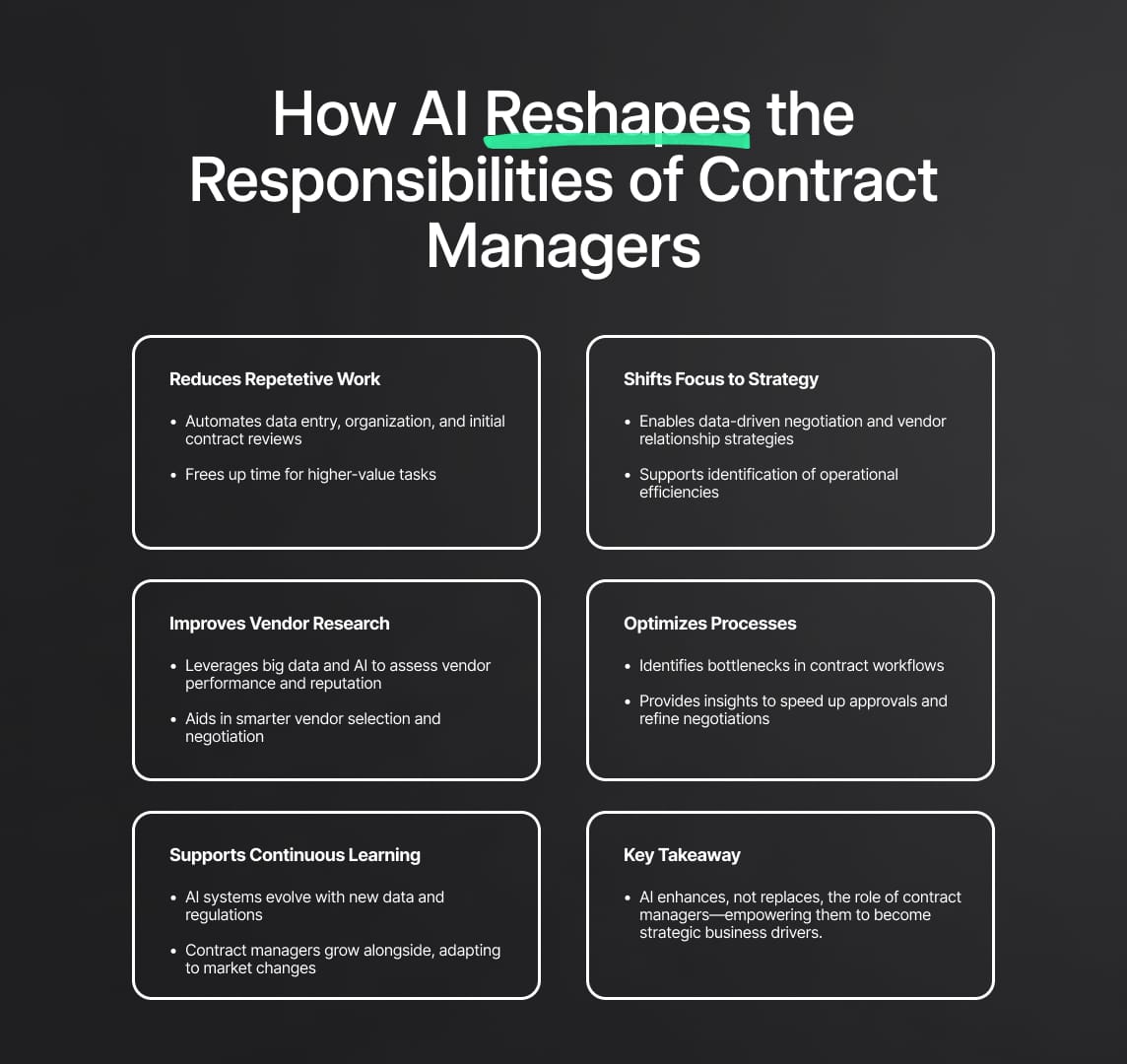
The ROI of CLM: Measuring the Business Impact of Contract Management
Adopting AI-powered Contract Lifecycle Management is more than a technological upgrade; it is a strategic business investment with a clear and quantifiable return. The benefits of a modern CLM platform deliver measurable improvements in operational efficiency, revenue generation, and risk management. By translating these advantages into hard numbers, you can build a powerful business case for implementing contract management software across your organization.
Driving Operational Efficiency and Cost Reduction
The most immediate impact of CLM automation is on operational efficiency. By automating the manual, repetitive tasks that consume legal and administrative resources, organizations unlock substantial cost savings and productivity gains.
- Accelerated Contract Timelines: Data consistently shows a dramatic reduction in the time needed to process contracts. A robust contract management system can reduce overall contract lifecycle times by up to 50%. The most significant gains are in the review and drafting stages, where automation can slash the required time by as much as 80%.
- Reduced Administrative Costs: Automating tasks like data entry, document routing, and deadline tracking directly lowers administrative overhead. Industry analyses indicate that contract management software can cut these costs by 25-30%. Considering a single complex contract can cost an enterprise up to $49,000 to process manually, these savings have a significant financial impact.
- Increased Team Productivity: By eliminating mundane work, AI-powered CLM allows professionals to focus on high-value strategic activities. Studies show this can increase overall team productivity by 44%. This means legal departments can manage a growing contract volume without increasing headcount, and procurement teams can dedicate more time to strategic sourcing instead of paperwork.
From Defense to Offense: How CLM Software Drives Revenue Growth
While cost savings provide a strong defensive argument for CLM, the offensive case, its ability to directly drive revenue, is even more compelling. A modern Contract Lifecycle Management platform transforms the contracting process from a sales bottleneck into a revenue accelerator.
- Faster Deal Closures: The contracting stage is often the final hurdle in the sales cycle. By integrating CLM directly with CRM platforms, sales reps can self-serve compliant contracts from pre-approved templates. This acceleration can shorten deal closure times by as much as 57%, allowing companies to recognize revenue faster and improve sales velocity.
- Plugging Revenue Leakage: CLM systems are essential for preventing the average 8.6% of contract value that is lost to post-signature errors. By automatically tracking all financial terms, payment schedules, and entitlements, the software ensures invoices are accurate and all earned revenue is collected. Proactive renewal management also prevents valuable customer contracts from expiring unintentionally.
- Identifying New Revenue Opportunities: A CLM platform serves as a rich repository of commercial data. By applying analytics to this data, businesses can uncover new growth opportunities, such as identifying existing customers who are prime candidates for upselling or cross-selling.
Strengthening Compliance and Proactively Mitigating Risk
Beyond the financial metrics, Contract Lifecycle Management delivers immense value by systematically reducing risk and strengthening an organization's compliance posture.
- Improved Compliance Rates: The automation inherent in CLM creates guardrails that ensure adherence to both internal policies and external regulations. By standardizing templates and automating approval workflows, organizations can boost compliance rates by as much as 55%.
- Systematic Risk Identification: AI excels at consistently identifying potential risks that a human reviewer might miss. By automatically flagging non-standard clauses or ambiguous language, AI provides a powerful safety net. This automated analysis can reduce the manual effort for contract assessment by 50%, allowing legal teams to focus on mitigating the most critical risks and providing leadership with a clear, enterprise-wide view of contractual risk exposure.
How CLM Software Acts as a Compliance Engine
In today's hyper-regulated global business environment, compliance is a fundamental requirement for survival. A single breach can lead to crippling fines, reputational damage, and a complete loss of customer trust. Modern Contract Lifecycle Management (CLM) has evolved into an indispensable compliance engine, providing the framework, controls, and auditability needed to navigate the complex web of regulations like GDPR, CCPA, HIPAA, and SOX.
The Foundation of Compliance: Building an Unimpeachable Audit Trail
At the heart of any robust compliance program is the ability to prove that proper processes were followed. A contract management software platform is designed to create this evidence trail automatically and immutably.
- Centralized Repository: The first step to control is consolidation. By bringing all contracts into a single, secure repository, CLM eliminates the chaos of documents scattered across shared drives and emails, creating a single source of truth.
- Complete Version Control: The system provides an unalterable history of every document change, tracking who made each edit, what was changed, and when. This provides perfect clarity on the negotiation history and prevents unauthorized modifications.
- Role-Based Access Controls: This core security feature ensures users can only access contracts and data relevant to their job function. This "principle of least privilege" is critical for protecting sensitive information and a key function of enterprise contract management.
- Immutable Audit Trails: Perhaps the most critical compliance feature, the audit trail is a comprehensive, time-stamped log of every action taken. Every view, edit, approval, and signature is recorded and cannot be altered, providing irrefutable proof of the entire process during an audit.
Data Privacy by Design: Meeting GDPR & CCPA Mandates with CLM
The General Data Protection Regulation (GDPR) and the California Consumer Privacy Act (CCPA) have reshaped the data privacy landscape. AI-powered Contract Lifecycle Management is a powerful tool for operationalizing compliance with these complex laws.
- Managing Data Processing Agreements (DPAs): GDPR and CCPA require specific contracts (DPAs) with any third-party vendor handling personal data. CLM systems provide compliant DPA templates and automate their lifecycle management to ensure these crucial agreements are always in place.
- Facilitating Data Subject Rights: When an individual exercises their "right to be forgotten," a company must locate all their data. A centralized CLM repository with powerful search allows an organization to instantly find all relevant contracts and respond in a timely, compliant manner.
- Enforcing "Privacy by Design": CLM platforms directly support this mandate with features like role-based access controls and robust data encryption (in-transit via TLS 1.2+ and at-rest via AES-256). Furthermore, AI can be trained to automatically identify and tag contracts containing Personally Identifiable Information (PII), flagging them for stricter handling.
HIPAA Compliance: Securing Protected Health Information (PHI)
The Health Insurance Portability and Accountability Act (HIPAA) imposes exceptionally strict rules to protect health information in the United States. CLM software designed for healthcare provides specific features to address these requirements.
- Business Associate Agreement (BAA) Management: HIPAA requires vendors who encounter Protected Health Information (PHI) to sign a BAA. Specialized healthcare CLM solutions offer compliant BAA templates, automated workflows for execution, and renewal alerts to ensure this critical compliance step is never missed.
- HIPAA-Compliant Security Architecture: Vendors serving the healthcare market provide platforms with security controls that meet HIPAA standards, including end-to-end encryption for all PHI, strict access controls, and detailed audit trails to prove compliance to regulators.
Ensuring Financial Integrity with SOX Compliance Controls
The Sarbanes-Oxley Act (SOX) mandates strict internal controls over financial reporting. As contracts are central to financial health, a contract management system is a vital tool for enforcing the controls required by SOX.
- Automating Internal Controls: CLM automates and enforces key financial oversights. Configurable approval workflows ensure contracts exceeding certain financial thresholds are automatically routed to the finance department, providing crucial segregation of duties and preventing unauthorized commitments.
- Providing Evidence for Audits: For a SOX audit, a company must prove its internal controls are effective. The CLM system's centralized repository and immutable audit trails provide auditors with a clear, transparent body of evidence, satisfying a core requirement of SOX Section 404.
- Enhancing Financial Transparency: SOX requires senior management to attest to the accuracy of financial statements. CLM dashboards provide leadership with a comprehensive view of all financial obligations and revenue commitments within the contract portfolio, empowering them to make their attestations with confidence.
| Regulation | Key Requirement | Addressing CLM Feature(s) |
|---|---|---|
| GDPR / CCPA | Data Security & Privacy | End-to-end encryption (in-transit and at-rest); Secure, cloud-based repository; Role-based access controls to limit access to Personally Identifiable Information (PII). |
| Data Subject Rights | Centralized, full-text searchable repository to quickly locate all data related to an individual's access or deletion request; AI-powered PII identification and tagging. | |
| Vendor Management | Management of Data Processing Agreements (DPAs) with compliant templates and lifecycle tracking. | |
| HIPAA | Protection of PHI | HIPAA-compliant security architecture; End-to-end encryption of all Protected Health Information (PHI); Strict, role-based access controls to prevent unauthorized viewing of patient data. |
| Business Associate Agreements | Dedicated BAA management module with compliant templates, automated workflows for execution, and renewal tracking and alerts. | |
| Auditability | Immutable audit trails logging all access and actions related to documents containing PHI, providing a clear record for regulatory review. | |
| SOX | Internal Controls (ICFR) | Automated and configurable approval workflows to enforce segregation of duties and financial oversight; Rules-based routing based on contract value or risk level. |
| Auditability & Reporting | Complete version history and immutable audit trails provide auditors with evidence of control effectiveness; Centralized repository simplifies access to financial contracts. | |
| Management Attestation | Real-time analytics dashboards providing management with a clear view of financial obligations and risks across the contract portfolio, supporting Sections 302 & 404 certifications. |
The Human-AI Symbiosis in Contract Management: People, Processes, and Ethics
Integrating Artificial Intelligence into Contract Lifecycle Management is more than a simple process replacement. It marks a fundamental shift in the relationship between people and technology, creating new roles and ethical responsibilities. Harnessing the full potential of AI-powered contract management software requires a focus on navigating ethical challenges, redefining professional roles, and investing in the human capital needed to succeed.
Navigating the Ethical Tightrope: Bias, Transparency, and Accountability in AI
The power of AI comes with significant ethical duties. An organization’s approach to these challenges is a critical indicator of its maturity and is essential for building long-term trust in its AI-driven contract management processes.
- The Challenge of Algorithmic Bias: AI models learn from the data they are trained on. If historical contract data contains implicit biases (e.g., contracts with certain demographics were subjected to greater scrutiny), an AI trained on this data will learn and perpetuate those biases, leading to discriminatory outcomes and significant legal risk.
- The "Black Box" Problem and Explainability: If an AI system flags a clause as risky without a clear rationale, it creates a "black box" that erodes user trust. For AI to be a useful co-pilot, its conclusions must be explainable. A user needs to know why a clause was flagged, and the system must provide the reasoning (e.g., "This liability cap is 80% lower than the average for this contract type").
- The Question of Accountability: When an AI-driven process leads to an error, who is responsible? The lack of clear legal frameworks necessitates robust internal governance that defines accountability and protocols for human oversight.
Mitigating these risks requires a proactive approach. Organizations must insist on human-in-the-loop (HITL) workflows for high-stakes decisions, ensuring AI assists rather than replaces human judgment. This must be supported by robust governance frameworks and careful auditing of training data to remove bias.
Redefining Professional Roles: From Administrator to Strategic Advisor
A common fear surrounding AI is job displacement. However, in Contract Lifecycle Management, the evidence points not to replacement, but to a profound and positive role transformation. AI empowers legal and procurement professionals by automating the most mundane aspects of their jobs, freeing them to operate at a higher, more strategic level.
This automation liberates skilled professionals from low-value work (data entry, chasing signatures) to focus on tasks that require uniquely human capabilities:
- Complex Negotiations: Engaging in nuanced, relationship-based negotiations that require intuition and creative problem-solving.
- Strategic Relationship Management: Building deeper, more collaborative partnerships with key suppliers and customers.
- Sophisticated Risk Analysis: Interpreting the data-driven insights provided by AI to make sophisticated judgments about strategic and financial risk.
In essence, the role evolves from a tactical administrator to a strategic advisor. The modern contract professional becomes the bridge between the AI's quantitative analysis and the business's qualitative goals, translating data into actionable strategy.
The Upskilling Imperative: Driving User Adoption and ROI
This role transformation requires a deliberate investment in upskilling your teams. User resistance is the single biggest barrier to realizing measurable value from a contract management software investment. A comprehensive upskilling program addresses this by equipping professionals with the new competencies required for success.
Key focus areas for training include:
- Data Literacy: Learning to read, interpret, and question the data in CLM dashboards to build a compelling business case for decisions.
- AI Tool Proficiency: Gaining hands-on experience with advanced AI features, such as using generative AI and interpreting AI-driven risk scores.
- Strategic and Influencing Skills: Sharpening skills in negotiation, collaboration, and stakeholder influence to communicate the story behind the data.
Investment in upskilling is not an optional expense; it is a hard requirement for success. Confident, skilled users will champion the new system, which is the only path to achieving the efficiency and insights that generate a positive financial return.
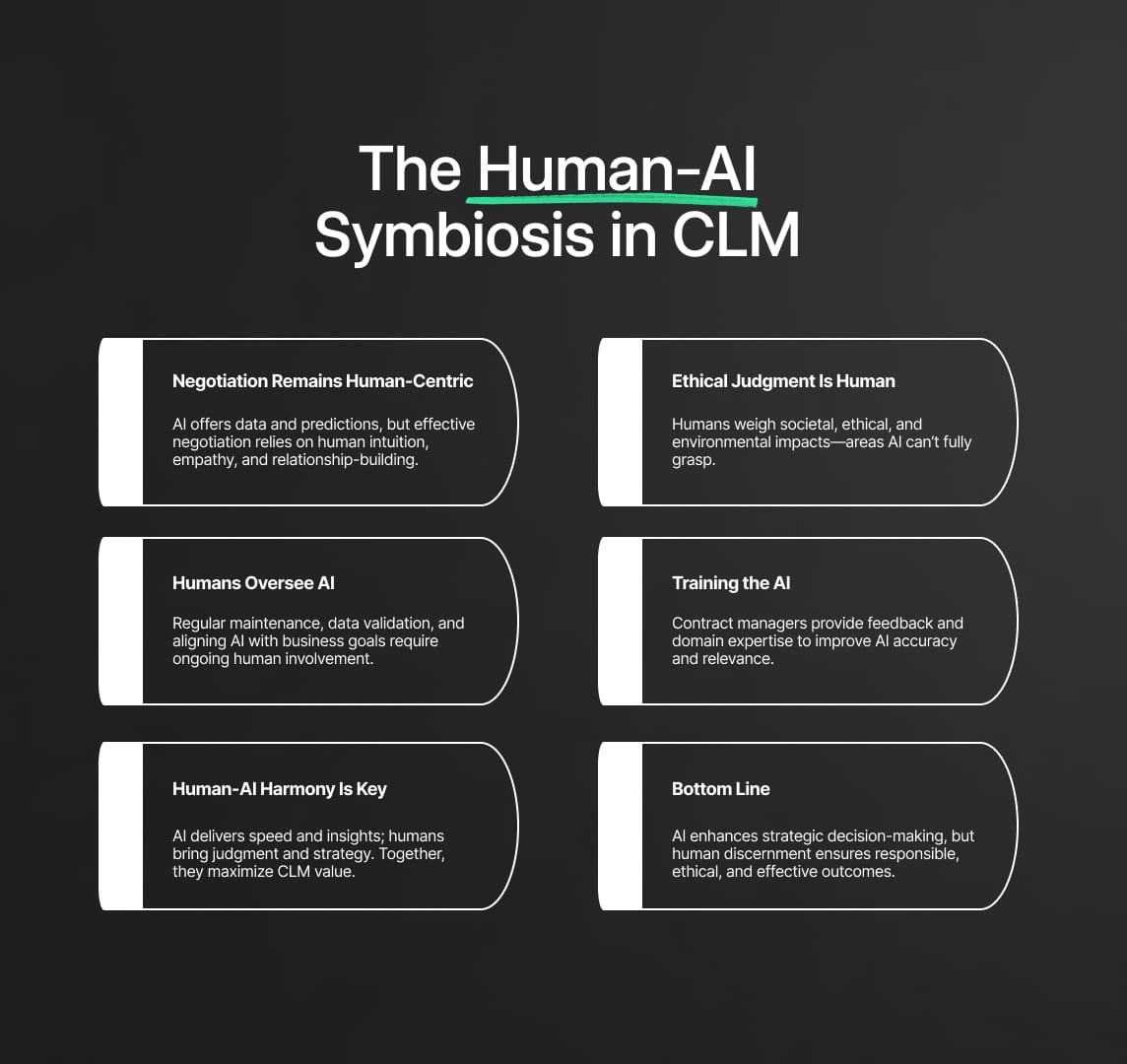
A Practical Guide to Selecting and Implementing CLM Software
Embarking on a Contract Lifecycle Management journey requires a clear strategy for both selecting the right technology and implementing it effectively. The market is crowded, and a successful rollout depends as much on people and process as it does on the platform itself.
How to Choose Your Platform: Analyzing the CLM Market Landscape
Navigating the CLM vendor landscape can be daunting. Authoritative reports from research firms like Gartner and Forrester provide invaluable guidance by evaluating vendors on criteria like "Ability to Execute" and "Completeness of Vision." This analysis reveals several distinct tiers of providers.
Enterprise-Grade Leaders (e.g., Icertis, Sirion) Consistently recognized as Leaders by top analysts, these platforms excel at handling extreme complexity and global scale. They offer deep, out-of-the-box integrations with major enterprise systems like SAP and Oracle, making them ideal for large, multinational corporations. The trade-off is that implementation can be lengthy and require significant investment.
AI-Native Challengers (e.g., Ironclad, Evisort) These vendors have built their platforms around AI-driven workflows and an intuitive user experience. They are strong in AI-powered data extraction and automated review, making them a favorite of agile, tech-forward legal and sales teams in mid-to-large enterprises who need to accelerate the contracting process.
Flexible No-Code/Low-Code Platforms (e.g., Agiloft) Frequently named a Leader for its highly configurable, no-code platform, this type of provider appeals to organizations with unique or evolving business processes. It empowers business users to adapt workflows without extensive coding, making migration and ongoing management smoother.
Suite-Based and Niche Offerings (e.g., DocuSign, Conga, Coupa, Grand) This category includes vendors where contract management is part of a broader business suite or serves a specific niche. DocuSign is strong on execution, Conga excels in Salesforce-centric organizations, and Coupa appeals to procurement-focused teams with its business spend management platform. Other niche providers in this space cater to specific industries or unique functional requirements.
Comparative Analysis of Leading CLM Platforms (2025)
| Vendor Category | Example Vendors | Key Differentiator | Ideal For |
|---|---|---|---|
| Enterprise-Grade Leaders | Icertis, Sirion | Unmatched scale, complexity handling, and deep ERP integrations. | Large, global enterprises with complex procurement and supply chains. |
| AI-Native Challengers | Ironclad, Evisort | Superior AI-driven workflows, speed, and user experience. | Tech-forward legal and sales teams focused on business acceleration. |
| Flexible Platforms | Agiloft | Highly configurable no-code platform for unique process needs. | Organizations with complex, non-standard, or evolving workflows. |
| Suite-Based & Niche | DocuSign, Conga, Coupa, Grand | Deep integration with a specific business function (e-signature, CRM, spend) or focus on a particular niche. | Teams seeking a CLM tightly aligned with an existing core platform or with unique industry needs. |
The Implementation Roadmap: A Phased Approach to Success
A successful Contract Lifecycle Management implementation is a strategic project, not just a software deployment. A phased approach that prioritizes preparation and change management is critical to achieving the desired outcomes and maximizing ROI from your contract management software.
Phase 1: Readiness and Strategy (The Foundation) This is the most crucial phase. Rushing this step is a common cause of failure.
- Define Goals & KPIs: Before evaluating any software, the organization must define what success looks like. This means setting clear, measurable objectives, such as "reduce average sales contract cycle time by 30% within 12 months" or "eliminate all unwanted auto-renewals by year-end."
- Stakeholder Alignment: Implementation cannot be a siloed effort. A cross-functional team must be assembled from the outset, including representatives from Legal, Sales, Procurement, Finance, and IT. Securing an executive sponsor who will champion the project is essential for overcoming organizational hurdles.
- Process Mapping: The team must thoroughly document the organization's current contracting processes. This exercise identifies existing pain points, bottlenecks, and inefficiencies, creating a clear picture of what needs to be fixed and a baseline against which to measure improvement.
Phase 2: Data Migration and Integration (The Technical Build) This phase involves preparing your contract data and connecting the new platform to your existing systems.
- Data Cleansing: A CLM system is only as good as the data within it. Before migration, organizations must conduct a thorough audit of their existing contracts. This involves identifying duplicates, correcting errors, and standardizing formats to ensure a clean start.
- Migration Strategy: There are two primary approaches to migrating data. A "big bang" migration moves all data at once, which is faster but carries higher risk. A "phased" migration moves data in stages (e.g., by department), which is lower risk but takes longer. The choice depends on the organization's complexity and risk tolerance.
- System Integration: To create a single source of truth, the CLM platform must be integrated with other core business systems. The most critical integrations are typically with CRM (e.g., Salesforce) to sync customer and deal data, and ERP (e.g., SAP, Oracle) to align contract terms with financial data. This seamless data flow elevates your contract management from a standalone tool to a core part of your business infrastructure.
Phase 3: Change Management and Adoption (The Human Element) This ongoing phase determines the ultimate success of the project and the value you get from your investment.
- Communication Plan: A clear and consistent communication plan is vital. It should articulate the "why" behind the change, the benefits for each department, and the implementation timeline. Communicating early and often builds trust and reduces uncertainty.
- Pilot Program: Instead of a company-wide rollout, it is a best practice to start with a small, high-impact pilot program. For example, automating the Non-Disclosure Agreement (NDA) process for the sales team can deliver a quick, measurable win that builds momentum and creates internal champions.
- Comprehensive Training: Training must be tailored to the needs of different user groups. Provide role-based instruction using a variety of methods, including hands-on workshops, online modules, and user guides, to cater to different learning styles. Ongoing support is key to driving long-term adoption.
Table: Key Performance Indicators (KPIs) for Measuring CLM Success
This table provides a comprehensive framework for measuring the performance and ROI of a CLM implementation.
| Category | KPI | Description | Why It Matters |
|---|---|---|---|
| Efficiency Metrics | Average Contract Cycle Time | The average number of days from contract request to execution. | A primary indicator of overall process speed. A reduction directly translates to faster revenue recognition and improved business agility. |
| Time Per Stage | The average time a contract spends in each lifecycle stage (e.g., drafting, legal review, approval). | Pinpoints specific bottlenecks in the workflow, allowing for targeted process improvements. | |
| Cost Per Transaction/Contract | The fully burdened cost (including time and resources) to process a single contract. | A concrete financial metric that demonstrates the cost-saving impact of automation and streamlined workflows. | |
| Effectiveness & Risk Metrics | Obligation Compliance Rate | The ratio of completed vs. missed contractual obligations (e.g., deliverables, reports, payments). | A direct measure of post-signature performance and risk management. High rates of missed obligations indicate significant value leakage and compliance risk. |
| Percentage of Contracts on Standard Templates | The proportion of new contracts created using pre-approved company templates versus third-party paper. | Higher usage of standard templates indicates better control, reduced risk, and faster review cycles. | |
| Average Contract Risk Score | The aggregated risk score of the contract portfolio, based on AI analysis of non-standard or high-risk clauses. | Provides a quantitative, enterprise-wide view of contractual risk exposure, enabling proactive mitigation strategies. | |
| Financial Metrics | Contract Value Leakage | The percentage of contract value lost due to factors like missed renewals, unbilled revenue, or penalties. | Directly measures the financial benefit of improved post-signature governance and aims to capture the ~9% of revenue typically lost. |
| Annualized Contract Value (ACV) | The total value of all active contracts, often tracked over time and segmented by type or department. | A key indicator of business health and growth, reflecting the overall value managed within the CLM system. | |
| Terminated Contract Remaining Value (TRV) | The unearned value in contracts that are terminated early (e.g., outstanding bills, unbilled services). | Highlights potential revenue loss from early terminations and can inform customer retention strategies. | |
| Adoption Metrics | User Login Frequency | How often users from different departments are logging into and using the CLM system. | A direct measure of user engagement and adoption. Low login rates are an early warning sign of a failing implementation. |
| Number of Self-Service Contracts Generated | The volume of contracts (e.g., NDAs) created by business users (e.g., sales, HR) without direct legal involvement. | Demonstrates the success of empowering business teams and freeing up legal resources for more strategic work. |
The Future of Contracting: From Intelligence to Autonomy
The evolution of Contract Lifecycle Management is far from over. While AI-powered intelligence represents the current state-of-the-art, emerging technologies are paving the way for a future where contracts are not just intelligent but increasingly autonomous. This forward-looking perspective reveals a trajectory that will further embed contracts into the operational fabric of the enterprise, transforming them from static records into self-executing, self-monitoring strategic instruments.
Emerging Horizons: Blockchain, IoT, and Smart Contracts
A powerful long-term vision for the future of contract management lies in the convergence of three distinct technologies: the Internet of Things (IoT), blockchain, and smart contracts. Together, they promise to create a system of truly automated and trustworthy commercial relationships.
The Internet of Things (IoT) as the Data Trigger IoT involves a network of physical devices—from shipping containers to manufacturing equipment—that collect and transmit data in real time. In a contractual context, these devices provide objective, verifiable proof that a real-world event has occurred, such as a GPS sensor confirming a shipment's arrival or a machine sensor reporting it has met an SLA uptime threshold.
Blockchain as the Immutable Trust Layer Blockchain technology provides a decentralized and immutable digital ledger. When data from an IoT device is recorded on a blockchain, it is cryptographically secured, making it virtually impossible to alter. This creates a single, shared source of truth that all parties can trust without needing a central intermediary to validate the data.
Smart Contracts as the Execution Engine A smart contract is a self-executing computer program where the terms of an agreement are written directly into code stored on the blockchain. The code defines the rules and is programmed to automatically execute specific actions, like releasing a payment, when certain conditions are met.
The synergy of these technologies enables a fully automated lifecycle. Imagine a supply agreement where an IoT sensor confirms a delivery, the event is recorded on the blockchain, and a smart contract automatically executes the payment. This entire process occurs without human intervention, eliminating delays, reducing overhead, and removing the potential for disputes.
The Immediate Future: The Rise of Agentic AI
While smart contracts represent a long-term vision, the more immediate evolution in contract management software is the emergence of Agentic AI. This marks a significant leap from current assistive AI tools to semi-autonomous agents that can pursue strategic goals.
An AI agent can be given a high-level objective and can then autonomously break that goal down into tasks, execute them, learn, and adapt its approach. For example, a General Counsel could give an AI agent a goal:
"Review all active supplier agreements expiring in the next 12 months. For those in the EU, renegotiate to include our new GDPR addendum and aim for a 5% cost reduction. Escalate any high-risk suppliers or those who refuse the new DPA."
The AI agent would then autonomously perform the following steps:
- Identify: Query the CLM database to identify all relevant contracts.
- Analyze: Analyze the current terms, performance history, and risk profiles.
- Benchmark: Access external data feeds to benchmark current pricing against market rates.
- Draft: Generate amended agreements with the new GDPR addendum and proposed pricing.
- Negotiate: Initiate automated negotiations by interacting with supplier portals or exchanging initial redlines.
- Execute & Escalate: For accepted agreements, route for e-signature. For complex negotiations, package all information and escalate the task to the designated human expert with a full summary.
This move toward agentic AI further elevates the human role to one of pure strategic oversight, exception handling, and management-by-objective.
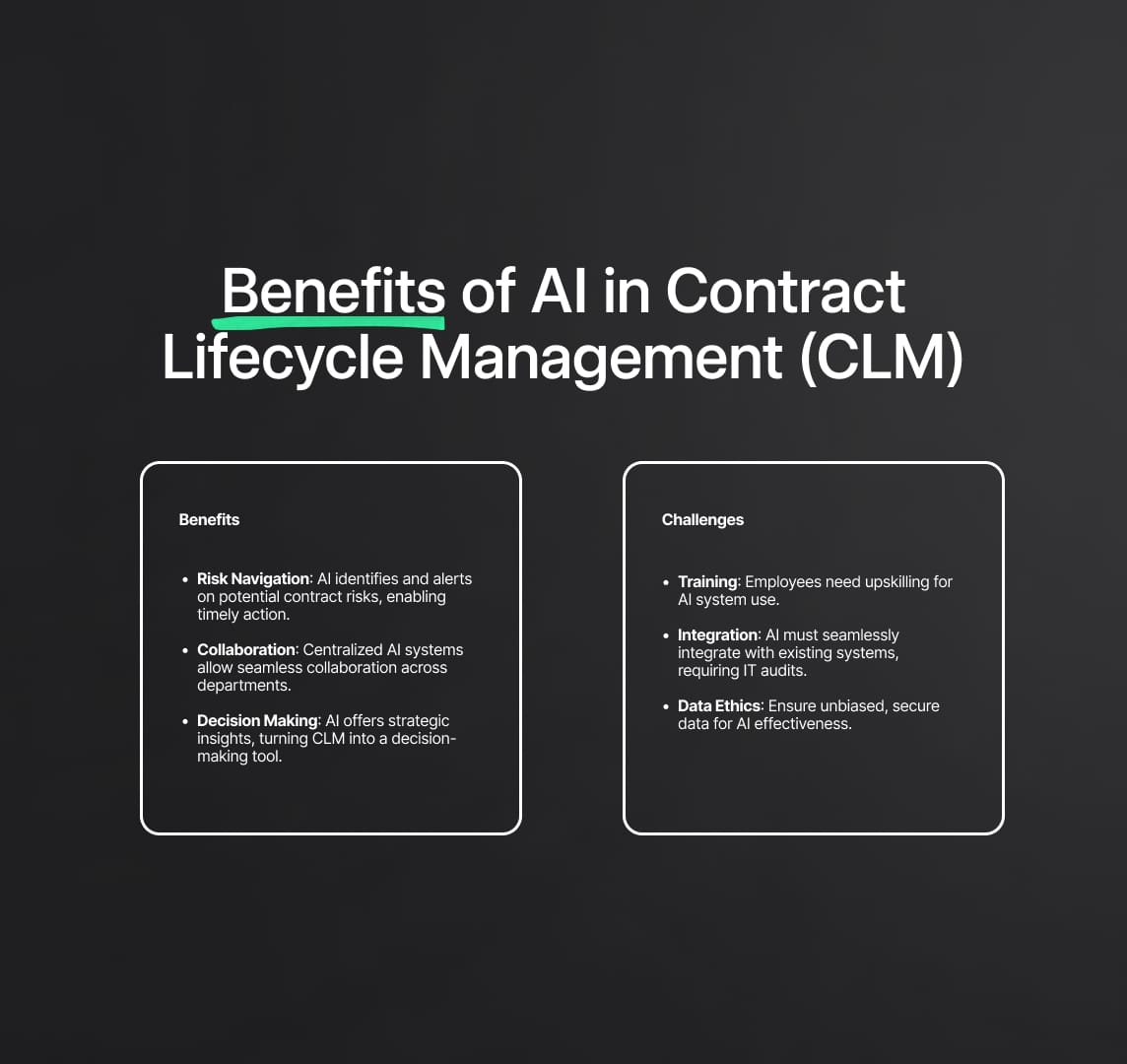
From Static Documents to Strategic Assets
The journey of Contract Lifecycle Management is a story of profound transformation—from paper to pixels, and from pixels to structured, strategic data. It is a fundamental shift from viewing contracts as a reactive administrative burden to recognizing them as proactive, data-rich assets that are the lifeblood of the entire enterprise.
The integration of Artificial Intelligence has been the catalyst for this revolution, turning passive contract management software into intelligent systems that accelerate revenue, mitigate risk, and ensure compliance. By automating the mundane, AI empowers legal and procurement professionals to transcend their traditional roles and become true strategic advisors.
However, this technological power comes with the responsibility of ethical stewardship. Navigating the challenges of bias and transparency while investing in the upskilling of human teams is a prerequisite for sustainable success. The most successful organizations will be those that master the human-AI symbiosis, blending computational power with human judgment.
Looking forward, the evolution continues. The horizon promises a world of increasingly autonomous agreements, while the immediate future will be defined by the rise of AI agents that execute complex goals. In this dynamic landscape, mastering the entire process of contract management is no longer an operational advantage; it is a core competency essential for any organization that seeks to thrive in an increasingly complex world.
Reduce your
compliance risks


